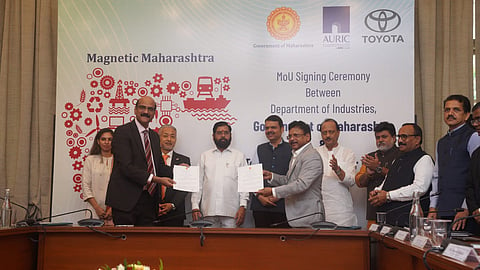

NEW DELHI: Toyota Kirloskar Motor (TKM) on Wednesday signed a Memorandum of Understanding (MOU) with the Government of Maharashtra to set up a Rs 20,000 crore manufacturing facility at Chhatrapati Sambhaji Nagar. The factory, which is expected to roll out 4 lakh cars per annum, will be used by TKM to manufacture electric and hybrid cars.
“An MoU was signed today between the Industries Department of the State Government and Toyota Kirloskar in the presence of Chief Minister @mieknathshinde. This MoU was signed to manufacture electric and hybrid cars at Auric City in Chhatrapati Sambhajinagar. The project will produce electric and hybrid cars at Chhatrapati Sambhajinagar,” Eknath Shinde, Chief Minister of Maharashtra, said on X.
He added that Rs 20,000 crores will be invested on this, and about 8 thousand direct and 8 thousand indirect, 16 thousand jobs will be created. He further said that this facility of Toyota is expected to produce 4 lakh cars per year.
TKM said it is considering a significant investment for setting up a greenfield manufacturing facility that will further strengthen the company's focus on advanced green technologies along with quality products and services.
The proposed investment, once finalised, is expected to be made over a multi-year period, potentially contributing to substantial job creation and economic growth in the region, it added.
“Backed by an expanding product portfolio, steadily increasing consumer demand for world-class products, and growing export orientation, the proposal for the new facility is a testament to TKM's strong commitment to India,” said the automaker in a statement.
The Japanese company believes strategic location is likely to enhance TKM's ability to meet business and logistical requirements more efficiently, allowing the company to serve wider markets within the country and abroad, thereby offering significant advantages and growth opportunities.
Masakazu Yoshimura, MD and CEO of Toyota Kirloskar Motor and Regional CEO at Toyota Motor Corporation (TMC), said, “Toyota Motor Corporation believes that India is well positioned to become a global manufacturing hub for cleaner and greener mobility solutions. This belief was reinforced with the recent regional restructuring, which elevated India to play a central role by being integrated into the Middle East, East Asia, and Oceania Region and acting as the hub of the new “India, Middle East, East Asia, and Oceania Region." Today’s MOU signing marks a pivotal point as we stride into the next phase of growth in the country, enabling us to contribute to enriching lives with qualitative mobility solutions locally and globally.”
At present, TKM has two plants located in Bidadi with an annual installed capacity of 3.42 lakh vehicles per year, employing over 6000 people.
In 2023, TKM announced fresh investments of about Rs 3,300 crores for a new 3rd plant in the Bidadi facility. This expansion would increase TKM’s production capacity by 100,000 units. With this third plant expansion going mainstream in 2026, TKM’s annual production capacity at Bidadi is expected to be augmented to 4.42 lakh annually.
Prior to this in the year 2022, the Toyota Group of companies that constitutes Toyota Kirloskar Motor and Toyota Kirloskar Auto Parts (TKAP) had signed and announced their Memorandum of Understanding (MOU) with the Government of Karnataka to invest Rs 4,100 crores aimed at making deeper cuts in CO2 emissions and enhancing electrification and a fast pace shift towards greener technologies.